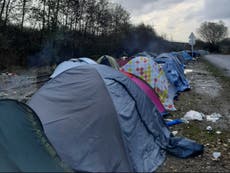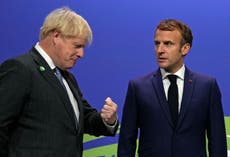Kurdish woman who wanted to live with husband-to-be in UK becomes first named Channel victim
A relative described her as a ‘romantic’ type of person and a ‘beautiful angel’
Your support helps us to tell the story
From reproductive rights to climate change to Big Tech, The Independent is on the ground when the story is developing. Whether it's investigating the financials of Elon Musk's pro-Trump PAC or producing our latest documentary, 'The A Word', which shines a light on the American women fighting for reproductive rights, we know how important it is to parse out the facts from the messaging.
At such a critical moment in US history, we need reporters on the ground. Your donation allows us to keep sending journalists to speak to both sides of the story.
The Independent is trusted by Americans across the entire political spectrum. And unlike many other quality news outlets, we choose not to lock Americans out of our reporting and analysis with paywalls. We believe quality journalism should be available to everyone, paid for by those who can afford it.
Your support makes all the difference.A young woman who was trying to join her fiance in the UK has become the first victim of the mass drowning in the Channel to be identified.
Maryam Nuri Hamdamin, who went by the nickname Baran, was a Kurdish student from northern Iraq in her early 20s.
Her relative Krmanj Ezzat Dargali confirmed her identity to the BBC and The Times.
He paid tribute to Maryam on Facebook by posting a photo of her at what appears to be her engagement party, and describing her in a poem as a “beautiful angel” who was a “romantic”.
A photo published by the BBC shows that Maryam had been in Germany before departing for France earlier this month.
Her fiance, who has not been named, said that he did not know that she was making her way to the UK with her female relative, and that she had planned to surprise him with her arrival.
He said that Maryam messaged him when the flimsy dinghy she and dozens of other people were in started to deflate.
She was one of at least 27 people who died on Wednesday after the tiny inflatable vessel capsized. At least 17 men, six other women, and three children died. There were only two survivors.
Maryam’s fiance told the BBC that she had tried to assure him that they would be rescued – but then he lost her GPS signal he used to track her when, he believed, the vessel was in the “middle of the sea”.
When he heard that a vessel had capsized in the Channel, he said he called the people traffickers but they told him they could not reach any of the people they put on the dinghy.
Her fiance said that the family heard the news of her death from two people who were with her, and that they were waiting for her body to be flown back to Kurdistan.
“I am in a very bad state,” he said.
Her relative Krmanj, who suggested in his Facebook post that Maryam was his first cousin once removed, told Sky News: “Her mother and father are totally devastated. The situation is just awful.
“She was a woman in the prime of her life. It’s a total tragedy and the whole family are in shock.”
He added: “I understand why so many people are leaving for a better life, but this is not the correct path. It’s the route of death.”
Krmanj said he hoped the British and French governments would “accept us in a better way”.
In the Grand-Synthe refugee camp in Calais, Sanger Ahmed, 33, spoke to the media to say that his two friends have not replied to his messages since getting in touch with him to say they were terrified about a journey on a dinghy.
Shakar Ali, 25, and Harem Pirot, 23, from Iraq, told Mr Ahmed that they had been forced onto the “flimsy, overcrowded” vessel by armed smugglers.
Mr Ahmed said: “I have heard stories about smugglers with guns making people get on board if they try and back out at the last minute. They are brutal people.”
He is concerned that his friends were on the dinghy and have died, but – as most victims have not been identified – his fears have yet to be refuted or confirmed.
Four children – Riaz Mohammed, 12, his relative Share Mohammed, 17, and two other boys Palowan, 16, and Shinai, 15 – were among those attempting to cross the Channel on the same day the dinghy capsized.
Their friends, who are unable to contact them, are worried that they also died at sea.
The French authorities have arrested five suspected people traffickers in connection with the drownings.
Meanwhile, Anglo-French relations have gone from bad to worse after the tragic deaths.
The French interior ministry announced it was withdrawing an invitation to home secretary Priti Patel to attend a meeting of ministers from key European countries in Calais on Sunday to discuss the crisis.
A spokesman for President Emmanuel Macron’s government reacted with fury after Boris Johnson publicly called on France to take back people who cross the Channel.
A French government spokesperson accused him of “double-speak” and said the letter – that includes five proposals – “doesn’t correspond at all” with discussions the two leaders had when they spoke on Wednesday.
Mr Macron said that Mr Johnson’s decision to post his letter on his Twitter feed suggested he was “not serious”.
“We do not communicate from one leader to another on these issues by tweets and letters that we make public. We are not whistleblowers,” he told a news conference.
Transport secretary Grant Shapps has insisted Mr Johnson’s proposals were made in “good faith”, and appealed to the French to reconsider their decision to withdraw the invitation to Ms Patel.
Downing Street attempted to play down the row, insisting the letter had been written in a “spirit of partnership and cooperation”.






